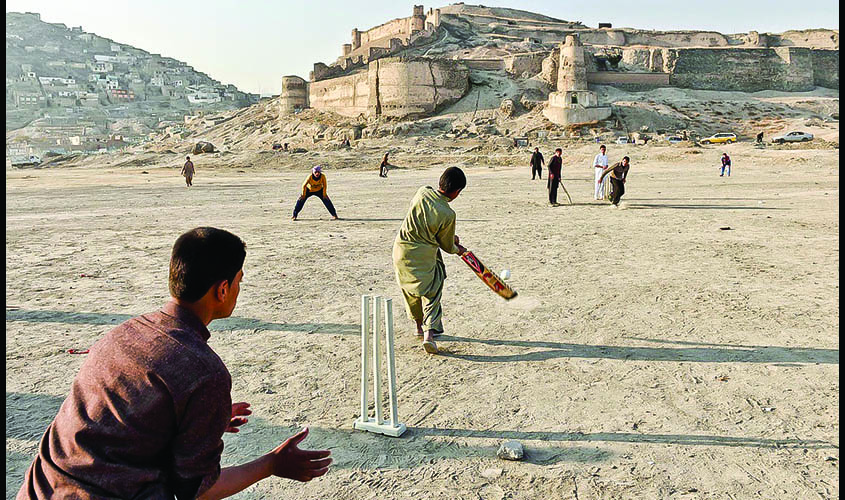On 14 June, Afghanistan debuted in the Test format against the No. 1 Test side, India and lost the one-off match by an innings and 262 runs.
On 19 May, terror, once again, shook Afghanistan. The country has time and again witnessed violence, but this time, a sport, which acted as a binding force in the war-ravaged country, was attacked. In seconds, the Spinghar cricket stadium in Jalalabad turned hell as multiple explosions killed eight people while dozens more who had gathered at the stadium to watch a night-time tournament were injured.
Miles away in India, worldís No. 1 T20 bowler, Rashid Khan, who hails from Jalalabad, mourned the demise of his countrymen and dedicated an IPL man-of-the-match award to pay honour to those who had died that day. Just days later, Afghanistan became the 12th Test-playing nation.
On 14 June, Afghanistan debuted in the purest form of the game against the No. 1 Test side, India and lost it by an innings and 262 runs.
The newest test nation might have faced a humiliating defeat in their historical match, but their cricketing journey from refugee camps of Pakistan to the Chinnaswamy Stadium, Bengaluru in itself is a big victory keeping in mind the fact that Afghanistan did not have a national team till 2001.
Tracking the rise of cricket in Afghanistan Cricket was first played in the sub-continental country during the 19th century when it was a British colony. However, it was in the 1990s that the Afghans, who fled the Soviet war at home, were exposed to the game in refugee camps of Pakistan (a country which had already won a cricket World Cup in 1992). A score of players in the current national team of Afghanistan, including former limited-over captain Mohammad Nabi, top-placed bowler in ICC T20 rankings Rashid Khan and right-handed batsman Karim Sadiq among others, grew up in the refugee camps.
In 1995, the Afghanistan Cricket Federation, now known as the Afghanistan Cricket Board, came into shape after Talibanís approval. But it was only in 2001 that the national team was formed. In the same year, the countryís cricket board became an affiliate member of the ICC.
Since then cricket in Afghanistan has seen steep growth, thanks to the unruly passion of Taj Malik. It is popularly said that had there been no Malik, cricket in Afghanistan would not have reached its present state and thus he is also called the father of Afghan cricket. Malikís role in developing the game in the country has been well depicted in the documentary “Out of the ashes”.
In 2004, the Afghanistan team, coached by Malik, played in the Asian Cricket Council (ACC) Trophy where they finished sixth in the tournament featuring 15 teams. Since then there was no stopping for a team who had embarked upon their cricketing journey.
In 2007, they were the joint winner of the the inaugural ACC Twenty20 Cup in 2007 alongside Oman. Later in the same year they defeated Jersey by two wickets to win the ICC World Cricket League Division Five. Enroute to cement their place on world stage, Afghanistan finished triumphant in the World Cricket League Division Four in Tanzania and Division Three in Argentina.
Participating in the World Cup Qualifiers 2009, the team just missed out for the ICC Cricket World Cup 2011 after losing to South Africa at the last stage.
Despite that heart-wrenching loss, Afghanistan achieved something big that day. Their performance in the tournament helped them gain the ODI status by the ICCóa massive achievement for a country which overcame war to make their own identity in the global sport.
Afghanistan played their momentous ODI match against Pakistan in Sharjah on 10 February 2012. Though they lost the match by seven wickets but the day was bookmarked to be remembered in the journey of the Afghan cricket. The following year, in 2013, Afghanistan was promoted from Affiliate to Associate member by the ICC.
Riding on the sheer force of will, the team registered another moment in the history of the countryís cricket when they finally sealed their berth for the ICC Cricket World Cup 2015óplausibly a dream of every Afghan then. The team lost five matches in their first stage and recorded their only win against Scotland.
But as some believe, if the journey is symbolic, the defeats may not matter. Afghanistan have come a long way in the sport and after all the struggles, cricket in Afghanistan was bound to see its day. On 22 June 2017, Afghanistan were awarded Full Member status along with Ireland. The cricketing journey which began with tennis ball in the refugee camps had reached to playing the red ball at the international stadium.

